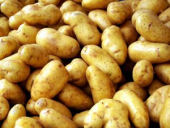
Purpose
To demonstrate the process of dehydration
Additional information
It's summer and it's HOT! There's no avoiding it (unless you live in Antarctica). When it's hot, your body perspires (aka sweats) as a natural means to thermoregulate itself. All of that perspiration that's cooling you down primarily consists of water. The more you perspire the more water comes from your body and the less hydrated you become. If you're not putting fluids back in your body, eventually you'll become dehydrated. Dehydration is an excessive lose of body fluids and can result in headaches, dizziness, decreased blood pressure, and (in extreme cases) death.
Sponsored Links
Required materials
- 1 Potato (small or medium sizes will work best)
- 2 Dishes or Saucers (deep enough to hold about a half-inch of water)
- Cutting board
- Knife
- Salt (about 2 tablespoons)
- Water
- Piece of paper
- Pen, pencil, or marker
Estimated Experiment Time
About an hour
Step-By-Step Procedure
- 1. Take your paper and mark it with the word "salted" and place it on a flat surface, such as a table.
- 2. Place one of the dishes on the paper and the other next to it.
- 3. Fill each dish with an equal amount of water (the water level should be high enough to fill the dish, but not so high that it overflows).
- 4. Stir two table spoons of salt into the dish marked "salted'.
- 5. Using your knife and your cutting board, cut the potato in half. Make sure to cut the potato so you have two equal size pieces.
- 6. Place one-half of the potato, flat side down, into the dish marked "salted".
- 7. Place the other half of the potato, flat side down, into the dish with plain water.
- 8. Let the potatoes sit in the dishes undisturbed for about an hour.
Note
Make sure to get help from an adult when handling the knife! It's suggested you ask an adult to cut the potatoes for you.
Observation
What do you think will happen to the potato that's bathing in the plain water? What will happen to the potato that's bathing in the salted water? What if you were to use something other than salt, such as vinegar? What would be the effects on the potato? How about if you were to use a different vegetable?
Result
The salt water is acting as a dehydrator by drawing moisture out of the potato. As the water is drawn out of the potato, the potato begins to get dehydrated. As it dehydrates, the potato shrivels.
Sponsored Links
Take a moment to visit our table of Periodic Elements page where you can get an in-depth view of all the elements,
complete with the industry first side-by-side element comparisons!